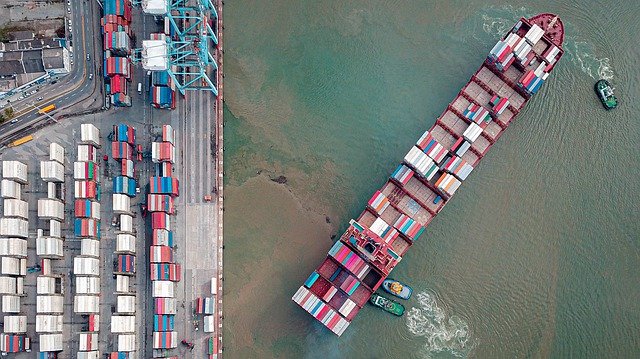- The House of Representatives has approved on final reading a bill strengthening government oversight on the shipping charges imposed by international shipping lines
- House Bill No. 10575 was approved on January 31 with 189 affirmative votes, zero negative votes and no abstention
- The bill requires port or terminal operators, international carriers and freight forwarders to inform the Maritime industry Authority of their charges and publish them in a newspaper
The House of Representatives has approved on third and final reading a bill that seeks to strengthen government agencies’ oversight functions over shipping charges imposed by international shipping lines operating in the Philippines.
House Bill (HB) No. 10575 was approved on January 31 with 189 affirmative votes, zero negative votes and zero abstention.
HB 10575 consolidates HB numbers 4316 and 4462. It aims to enhance competitiveness of the Philippine maritime trade by strengthening government oversight functions over shipping charges imposed by international shipping lines and by institutionalizing mechanisms for the efficient movement of goods.
HBs 4316 and 4462, filed in 2019, seek to regulate and standardize local charges imposed at both origin and destination by foreign shipping lines.
Stakeholders have claimed high shipping charges “are caused by a lack of regulatory oversight as there is no agency assigned to oversee local charges imposed by international shipping lines.”
Aiming for transparency
HB 10575 aims to promote transparency by mandating all port or terminal operators, international carriers, non-vessel operating common carriers (NVOCC), and freight forwarders to inform the Maritime industry Authority (MARINA) of their shipping charges and fees and publish them in a newspaper of general circulation.
Under the bill, no charges or fees should be imposed beyond the published rates.
No local charges or surcharges, except for internationally accepted surcharges, fees for value-added services, and behavioral charges such as late payment fee and container insurance, should be charged by international shipping lines or their agents, freight forwarders, and NVOCCs on Philippine consignees and shippers.
The imposition and parameters or such imposition must also be clearly defined in the contract of carriage and subscribed by the shipper or consignee.
Moreover, no new or initial rate or change in the existing rate that increases the cost for the shipper may become effective earlier than 30 days after filing with MARINA, except when allowed by the maritime authority for a reasonable cause.
HB 10575 requires that certified copies of all existing agreements made between and among international carriers operating in Philippine ports that affect maritime trade must be submitted to MARINA.
MARINA is authorized to review whether the agreement or amendment could unreasonably reduce transportation services or increase transportation cost, and refer it to the Philippine Competition Commission (PCC) for appropriate action.
No detention charges in the return of empty containers should be imposed by shipping lines for delays caused by the carriers. Any demurrage fee or detention charge should not constitute a direct or indirect lien on container deposits or on other cargoes or shipments covered by a separate transaction of the same shipper or consignee.
Under the bill, MARINA may allow container deposits only in the following circumstances:
• If the freight forwarders or agents of international shipping lines implement an expeditious procedure for refunding the deposit within a non-extendable period of 15 days from the return of the container.
• There are clear and fair standards for deduction made known by the freight forwarders or agents to the other party prior to the engagement.
• There is actual proof that a container deposit has been paid before any deduction is made.
Provisions, prohibitions
HB 10575 prohibits international carriers and their agents and port or terminal operators to operate under an agreement that has been suspended through an order of a proper authority, or a temporary restraining order, or rendered ineffective by injunction issued by the court.
Moreover, HB 10575 prohibits international carriers and their agents, port or terminal operators, freight forwarders, NVOCCs, or logistics service providers, either alone or in connivance with one another, to directly or indirectly charge, demand, collect, or receive greater, less or different compensation for transporting property or for any related service other than the rates and charges in the service contract or those published and filed with MARINA.
International carriers and their agents, port or terminal operators, freight forwarders, NVOCCs, or logistics service providers, either alone or in connivance with one another, directly or indirectly, are also prohibited from engaging in anti-competition practice.
HB 10575 identifies the roles of the Department of Transportation, MARINA, Department of Trade and Industry (DTI), Philippine Ports Authority and other port authorities, Bureau of Customs, and PCC in implementing the proposed law.
It provides additional members to the MARINA Board and expands the Board’s powers to carry objectives of the proposed law.
Additionally, the MARINA Board is mandated to formulate a National Logistics Efficiency Policy to guide in the formulation and issuance of rules, regulations, and programs of implementing agencies.
MARINA is likewise mandated to prescribe the fines and penalties for violations of the proposed law and its guidelines.
MARINA and DTI, in coordination with the private sector, must develop a program to educate all Philippine shippers and consignees on international commercial terms used in negotiation, freight and charges, current best practices, and any new developments.
HB 10575 will be transmitted to the Senate for its concurrence. The bill has no counterpart measure in the Senate.





